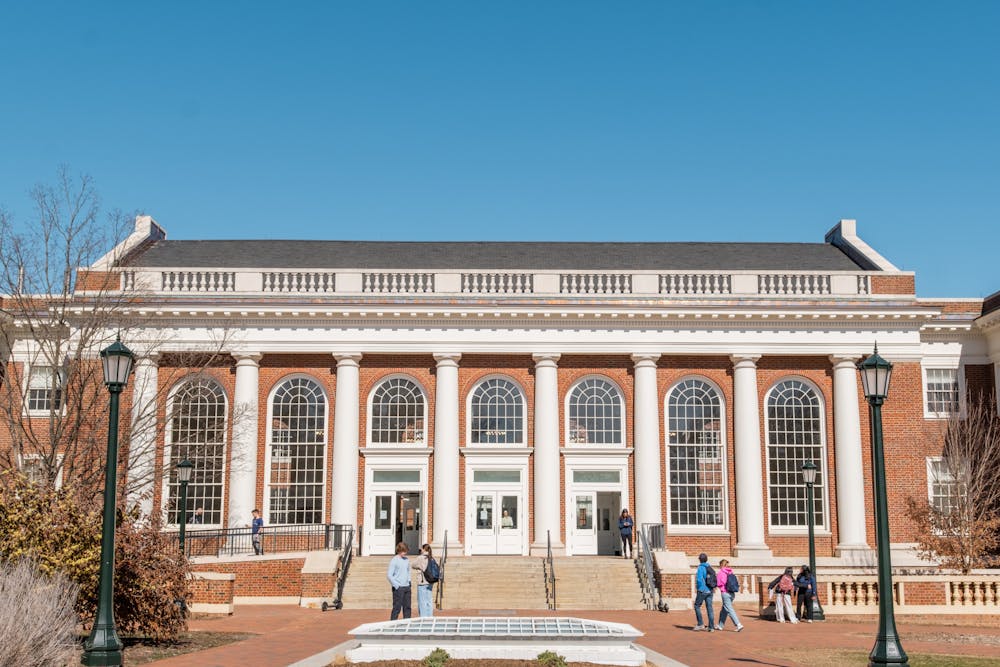After three years of construction, Alderman Library opened this January and has quickly become a prominent marker of the University landscape. Arguably more important than its architectural allure, however, is the name behind the building which commemorates Edwin Alderman, the first and longest-serving president of the University. The Board of Visitors will soon consider whether to rename this newly reopened place of learning. Some argue that Alderman’s support of eugenics and his undoubtedly racist beliefs mean that he is an unsuitable namesake for a campus building. But such criticisms ignore the important economic and educational contributions Alderman imparted on the University. Moreover, in order for us to truly reckon with and preserve our history, both good and bad, the Board should refrain from erasing Alderman’s name and instead work to critically communicate the complex person Alderman was.
To be clear — views relating to eugenics and racism are reprehensible and should not be accepted by any one in society today. Yet, for the first half of the twentieth century, these eugenic views were widely prevalent in American society. Similarly, our founder Thomas Jefferson’s views on slavery were endemic in the United States during his lifetime. If we do not accommodate past figures having different views than our own, we would also need to tear down the statue of Jefferson that stands at the front of the Rotunda. Societal standards of morality change over time. Expecting our morals and political priorities to align with those from the past would be illogical and revisionist.
When explaining why the University should impose our present morals on naming customs, many have noted that the University has renamed buildings representing racists before. Maury Hall, for example, was renamed to John W. Warner Hall in 2022 because Maury was an outspoken proponent of slavery in the United States. Similarly, the name Curry was dropped from the School of Education and Human Development because J.L.M. Curry was a slave owner who fought for the Confederacy. But what both these instances share is a lack of any significant connection to the University.
Alderman, in contrast, played a vital role in our history and in our current understanding of our University. In his time here, Alderman grew the University’s endowment from $350,000 in 1904 to $10 million in 1929, demonstrated an admirable commitment to social sciences and established the University as a leading school in the South and the country at large. Because Alderman was so crucial to building the University into the public ivy it is today, his history, unlike Maury’s or Curry’s, is intrinsically linked to that of the University. It would be irresponsible to censor the history of someone so critical to our development as an institution.
Nevertheless, some critics argue that irrespective of Alderman’s importance, representing him through building titles is problematic. In this view, by memorializing people like Alderman, we implicitly revere and amplify their views. Indeed, even the University’s Naming and Memorials Committee has stated that names are a mark of the University’s identity and values. But this fails to recognize the true usefulness of names. In reality, names are a reminder of our history, both good and bad. By keeping history ever present around us, we can become better acquainted with the complicated past of our University — both Alderman’s positive legacy and his discriminatory ideologies hold lessons about the past which are relevant for the progress we seek. Names, then, are tools that challenge us to be continuously critical of the space we inhabit and progressively build a more diverse and inclusive future. To remove Alderman’s name and remembrance would be to bury the shameful aspects of our past, which we should instead recognize and learn from.
The Naming and Memorials Committee’s contextualization initiative already recognizes the importance of creating robust digital spaces dedicated to informing viewers about the varied legacy of our predecessors. Digital databases provided context for numerous sites around Grounds, such as the Whispering Wall. Integrating the history of Alderman Library into this framework would allow students to explore the full extent of his significance to the University, in a way far more robust than just a plaque. Efforts like this preserve our history, whilst educating students, visitors and citizens and providing context on the loathsome views held by those who hold a part in our past. For these efforts to truly be successful, however, digital databases are also insufficient. Rather, Alderman’s name must be seen and heard resolutely in order for his legacy to be contextualized appropriately.
The names of the University’s past are emblematic of a shared history that is complex and checkered. Our institution’s past has been, from its founding, has been a combination of an idealistic promise and a racist reality — we must continuously remember this dichotomy as we aim to move towards the former. It has commonly been said that those who cannot remember the past are condemned to repeat it. By having all parts of our history constantly around us, we can ensure that we remember our community’s past failures and learn from them in our attempts to move forward. The Board should recognize the instructive importance that names have and reject the proposal to rename Alderman Library.
Wylie Brunman is an opinion columnist who writes about politics for The Cavalier Daily. He can be reached at opinion@cavalierdaily.com.
The opinions expressed in this column are not necessarily those of The Cavalier Daily. Columns represent the views of the author alone.







